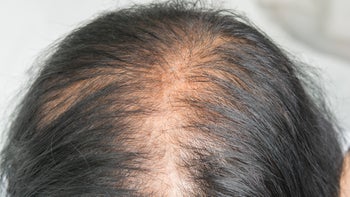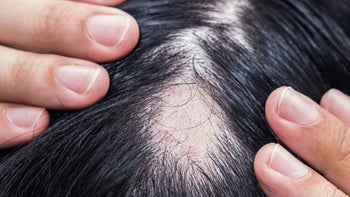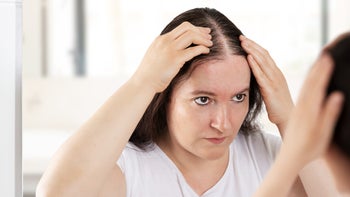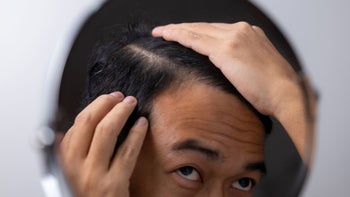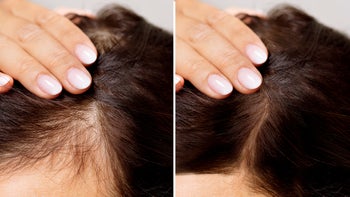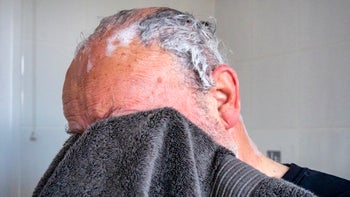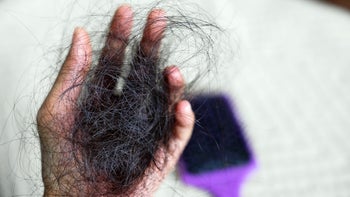
Biotin for Hair and Nail Growth: Does It Really Work?
Key takeaways:
Biotin is an important vitamin that keeps you healthy by turning the food you eat into energy.
Many people take extra biotin for hair growth or nail growth, but there isn’t much research to back up these claims.
If you have low biotin levels, taking extra biotin can help with brittle nails and hair loss.
Access savings on related medications
Table of contents

If you take biotin for hair or nail health, you’re not alone. Almost 20% of people in the U.S. consume some type of biotin. And they don’t always tell their healthcare team about it. Biotin is found in many health and beauty products. Some physicians even recommend it.
With all this marketing and hype, many people assume that biotin works to improve hair and nail health. But is this actually true?
It turns out there’s not much science to back up these claims. Let’s take a look at what the research shows, when biotin may be helpful, and how taking too much of it can affect some lab test results.
Search and compare options
What is biotin?
Biotin (vitamin B7) is a B vitamin that’s found in many foods, like:
Fish
Meat
Seeds
Some vegetables (like sweet potatoes)
Some bacteria in the intestines also make biotin, which is then absorbed into the body.
So what’s biotin good for? Biotin is needed for your cells to work correctly. It helps cells turn fat, glucose (sugar), and protein into energy. It also helps regulate your genes and how cells communicate with each other.
Does biotin work for hair and nail growth?
If you walk down the supplement aisle, you may notice that biotin seems to be everywhere. There’s biotin for hair loss and biotin for nails. And it’s often combined with other vitamins. But does it really work?
The answer may depend on a few different factors:
Whether or not you have low biotin levels
If you’re experiencing hair loss
If your nails are especially brittle
Causes of hair loss: From hormonal changes to stress and autoimmune conditions, we’ve got you covered. Learn about the most common causes of hair loss.
Tips for brittle nails: Find out why your nails might be brittle or weak. And learn what you can do about it.
Natural hair-growth remedies: Caffeine and melatonin are some surprising options if you’re looking for ways to boost hair growth. Find out what the science says about other home remedies.
It turns out that there’s not much research to back up the claim that biotin works for hair or nail growth. Let’s take a look at each one separately.
Biotin for hair growth
Biotin plays a role in hair growth. People with low levels of biotin are more likely to experience hair loss. And there’s some evidence that taking biotin supplements may help hair growth if you are biotin deficient and experiencing hair loss. But there aren’t enough good studies on it to say for sure that it works.
One study found that almost 40% of women with hair loss were biotin deficient. But most people aren’t low in biotin. And in otherwise healthy people without hair loss, there’s no evidence that biotin is helpful.
A review of the research on biotin found that — despite the widespread popularity of biotin for hair growth — there isn’t much scientific evidence to support its use.
So, if you’re experiencing hair loss, it may be worth talking to a health professional you trust about biotin for hair growth. But if you’re otherwise healthy and you haven’t had hair loss, there’s no good evidence that taking biotin will help your hair grow.
Biotin for nail growth
Biotin may help some people with brittle nails. Studies show that taking 2.5 mg (2,500 mcg) biotin daily may improve nail firmness, hardness, and thickness. In one study, over half of the people taking biotin 2.5 mg a day had a 25% increase in the thickness of their nails.
So far, the studies evaluating biotin and nails have been small and not of the highest quality. This is why more research needs to be done to prove that biotin really helps strengthen nails.
Biotin deficiency: Who is at risk?
Certain conditions are linked to low biotin levels. These include:
Genetic causes of biotinidase deficiency: Some people have a genetic condition that leads to biotin deficiency. This can cause skin problems and neurological problems. People with this condition will need to take biotin for life.
Chronic alcohol exposure: Drinking alcohol regularly is linked with low biotin levels. This might be because chronic alcohol exposure can lower the absorption of biotin.
Pregnant and nursing women: Changes during pregnancy and nursing can lower biotin levels. So some experts recommend increasing biotin intake for this group.
Eating large amounts of egg whites: Egg whites contain a chemical that lowers your body’s ability to absorb biotin. So there are reports of biotin deficiency caused by eating too many egg whites.
How much biotin should you take for hair and nail growth?
Despite all of this, if you want to try biotin, how much should you take?
The daily adequate intake for biotin is 30 mcg for nonpregnant adults. This means that you should consume at least this amount each day. Most people on a Western diet have no problem getting this amount, since they get about 35 mcg to 70 mcg of biotin from their food.
There are no clear guidelines for how much biotin you should take if you’re taking it for hair or nail growth.
Can you take too much biotin?
High doses of biotin probably aren’t toxic. Biotin is water soluble, so the body gets rid of any extra through urine. There isn’t any evidence that biotin is toxic, even when high doses are used. So the Food and Nutrition Board hasn’t established any clear guidelines for how much biotin is too much.
Is biotin safe to take every day?
Biotin is safe to take every day. But it’s important to know that sometimes taking biotin can interfere with certain blood tests. So make sure to tell your healthcare professional if you’re getting bloodwork done and you take biotin regularly.
Risks and side effects of biotin
Most people taking biotin don’t have side effects. But some people experience symptoms like stomach ache and insomnia.
Taking biotin regularly can come with a different kind of risk: It can interfere with the results of certain lab tests. This means that the test results may not be accurate. The actual amount may be higher or lower than what the test reports. Biotin can interfere with the results of these blood levels:
Hormones — like vitamin D and thyroid hormone
Troponin — a blood marker that helps diagnose heart attack
Biotin-rich foods
If you want to boost your biotin intake without turning to supplements, you have plenty of options. Foods high in biotin include:
Eggs (both egg white and yolk together)
Avocados
Nuts
Meat
Fish
Seeds
Certain vegetables
What does work to help regrow hair?
If you’re trying to regrow or thicken your hair, there are some options other than biotin that have been proven to work. These include different medications and procedures, like:
Minoxidil (Rogaine)
Finasteride (Propecia)
Platelet-rich plasma
Hair transplant
Your dermatologist can help you figure out the best treatment plan for your situation.
The bottom line
Biotin is a vitamin that helps your body do many important things, like turn your food into energy. Most people get enough biotin through their diet with things like fish and seeds. Many people take extra biotin for their hair and nail health.
Studies show that biotin only helps hair grow if you have low biotin levels. But some people with brittle nails may benefit from extra biotin. Taking biotin is pretty safe. But keep in mind that it can interfere with the accuracy of certain lab tests.
Why trust our experts?


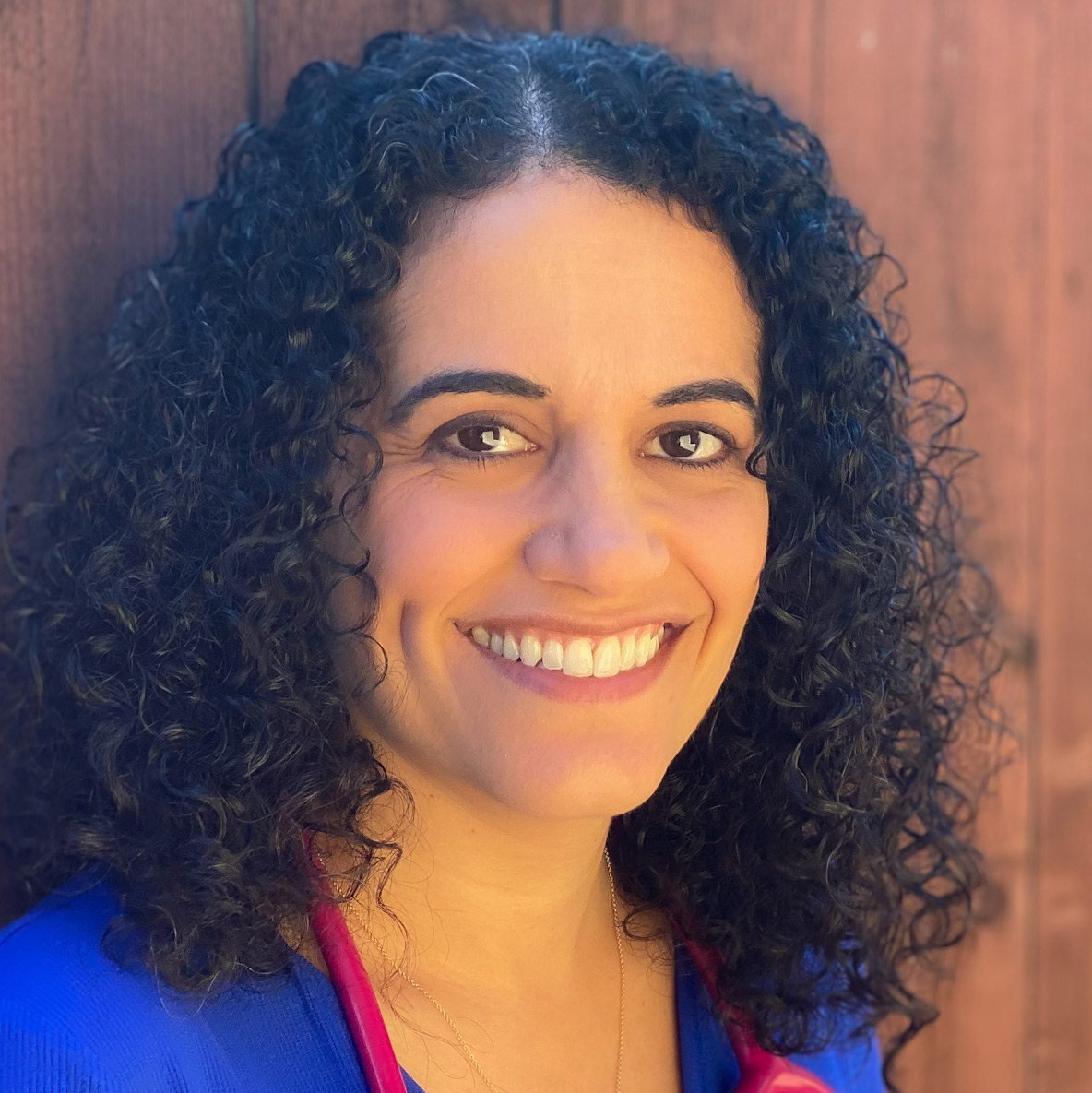
References
Hochman, L. G., et al. (1993). Brittle nails: Response to daily biotin supplementation. Cutis.
Krabbe, J. P. (2023). Biotin deficiency caused by long-term raw egg consumption: A case report. Nutritional Perspectives: Journal of the Council on Nutrition of the American Chiropractic Association.
Lipner, S. R. (2018). Rethinking biotin therapy for hair, nail, and skin disorders. Journal of the American Academy of Dermatology.
Nosewicz, J., et al. (2022). The epidemiology, impact, and diagnosis of micronutrient nutritional dermatoses. Part 2: B-complex vitamins. Journal of the American Academy of Dermatology.
Office of Dietary Supplements. (2021). Biotin: Fact sheet for consumers. National Institute of Health.
Office of Dietary Supplements. (2022). Biotin: Fact sheet for professionals. National Institute of Health.
Patel, D. P., et al. (2017). A review of the use of biotin for hair loss. Skin Appendage Disorders.
Perry, C. A., et al. (2014). Pregnancy and lactation alter biomarkers of biotin metabolism in women consuming a controlled die. The Journal of Nutrition.
Saleem, F., et al. (2023). Biotin deficiency. StatPearls.
Srinivasan, P., et al. (2014). Chronic alcohol exposure inhibits biotin uptake by pancreatic acinar cells: Possible involvement of epigenetic mechanisms. Gastrointestinal and Liver Physiology.
Subramanya, S. B., et al. (2011). Inhibition of intestinal biotin absorption by chronic alcohol feeding: cellular and molecular mechanisms. Gastrointestinal and Liver Physiology.
Trüeb, R. M. (2016). Serum biotin levels in women complaining of hair loss. International Journal of Trichology.
U.S. Food and Drug Administration. (2019). UPDATE: The FDA warns that biotin may interfere with lab tests: FDA safety communication.
Walth, C. B., et al. (2018). Response to: ‘Rethinking biotin therapy for hair, nail, and skin disorders’. Journal of the American Academy of Dermatology.
Wan, Z., et al. (2022). Intermediate role of gut microbiota in vitamin B nutrition and its influences on human health. Frontiers in Nutrition.
Yelich, A., et al. (2024). Biotin for hair loss: Teasing out the evidence. Journal of Clinical and Aesthetic Dermatology.




